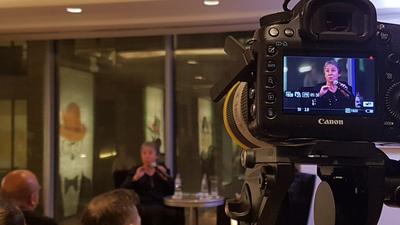“I’m deeply sad inside, but I need to appear strong in front of my family. It’s very difficult. Seven of my relatives were killed by the bombings and shootings in Syria. We saw their mutilated bodies. I buried them myself and buried my neighbours too. My son disappeared. One month later, my brother disappeared. I’m sure they got killed,” tells Mahmood, who left the Yarmouk Palestinian refugee camp near Damascus more than one month ago.
He now lives in Ain el-Helweh with his wife and six-year old son in a narrow room, separated in two by a plank of wood to accommodate another family.
“This is just one amongst the many stories we hear everyday,” explains Nissreen Moghamis, an MSF social worker.
In Saida, MSF has been running a community-based mental health programme since April 2011, working in five health facilities and targeting primarily the Palestinian population of Ain el-Helweh, as well as other vulnerable populations groups living in and outside the camp, including the Lebanese.
Fleeing Syria
In the past six months, an estimated 2,400 families fleeing Syria – mostly Palestinians, but also Syrians – have taken refuge in this already overcrowded camp.
Created in 1948 to accommodate 10,000 people, Ain el-Helweh has become the largest Palestinian refugee camp in Lebanon, now hosting an estimated 80,000 people for the same surface.
Newcomers are living with host families, renting accommodation or gathering in collective shelters and some tents in the camp. Both the camp residents and newcomers need to adjust to their new living conditions – a situation which has translated into growing needs for mental health services.
Depression, anxiety and post-traumatic stress disorder
Depression, anxiety, and post-traumatic stress disorder are the most common diagnoses amongst MSF’s patients coming from Syria.
Since the beginning of the year, the mental health team has registered a progressive increase in the number of patients coming from Syria – mostly Palestinian refugees, but also Syrian nationals – representing now 43 percent of MSF’s new patients.
“There’s a high level of trauma: many have witnessed the killings of relatives and friends, the burning of their houses, some of them have been tortured. A lot of people suffer from panic attacks, memory gaps or nightmares. On top of this, they face very difficult living conditions and struggle to find basic life necessities," says Manal Kassem, a psychotherapist working in one of MSF’s clinics.
Domestic violence
Proximity creates numerous conflicts. “It happens that 10 or more people from different families share a single room and one public toilet for everyone," explains Abu Saleh, a Palestinian refugee who’s been living in the camp since 2006.
Domestic violence has increased because people find it difficult to adjust to their new situation. In some instances, roles of family members are being reversed.
“It is the women who ask for assistance and bring back food, milk, diapers to the household, while the men are struggling to find jobs or are too embarrassed to ask for help.
"In most cases, the causes of conflict within families are trivial, but things turn sour because of the poor living conditions”, continues Abu Saleh.
In other cases, conflicts arise between families due to unfair distributions of assistance from private donors.
Mental health programme
“Some people tell me: give me a shelter and my mental health will be fine," says Mohamed Zeidan, one of MSF’s social workers doing daily house visits, providing psycho-education, and referring people to other organisations to benefit from non-medical services, such as financial support to pay their rent, for example.
“We provide at least first psychological aid and support them mentally," says psychotherapist Manal Kassem.
In some cases, if not treated on time, a person suffering from post-traumatic stress disorder may develop more severe psychological symptoms over time.
MSF also provides free treatment to refugees who were on medication before and had to stop their treatment because of war and financial difficulties.




